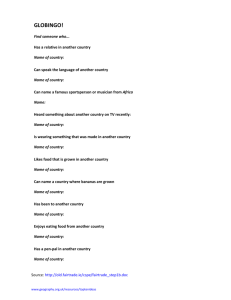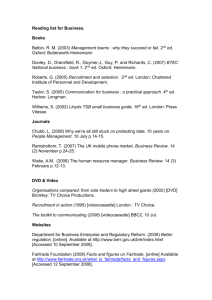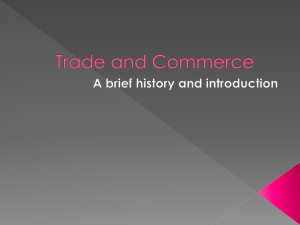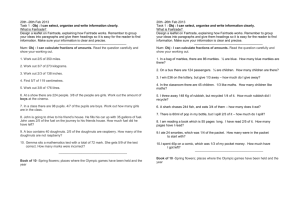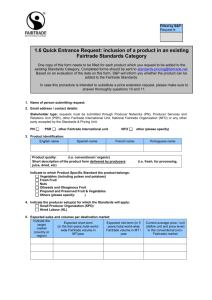Annex 2 New Trader Standard applied to sugar
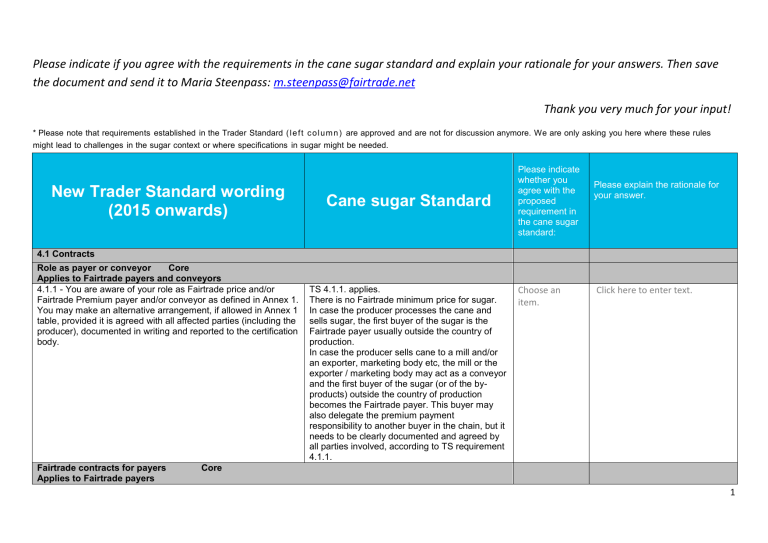
Please indicate if you agree with the requirements in the cane sugar standard and explain your rationale for your answers. Then save the document and send it to Maria Steenpass: m.steenpass@fairtrade.net
Thank you very much for your input!
* Please note that requirements established in the Trader Standard ( l e f t c o l u m n ) are approved and are not for discussion anymore. We are only asking you here where these rules might lead to challenges in the sugar context or where specifications in sugar might be needed.
New Trader Standard wording
(2015 onwards)
Cane sugar Standard
4.1 Contracts
Role as payer or conveyor Core
Applies to Fairtrade payers and conveyors
4.1.1 - You are aware of your role as Fairtrade price and/or
Fairtrade Premium payer and/or conveyor as defined in Annex 1.
You may make an alternative arrangement, if allowed in Annex 1 table, provided it is agreed with all affected parties (including the producer), documented in writing and reported to the certification body.
TS 4.1.1. applies.
There is no Fairtrade minimum price for sugar.
In case the producer processes the cane and sells sugar, the first buyer of the sugar is the
Fairtrade payer usually outside the country of production.
In case the producer sells cane to a mill and/or an exporter, marketing body etc, the mill or the exporter / marketing body may act as a conveyor and the first buyer of the sugar (or of the byproducts) outside the country of production becomes the Fairtrade payer. This buyer may also delegate the premium payment responsibility to another buyer in the chain, but it needs to be clearly documented and agreed by all parties involved, according to TS requirement
4.1.1.
Fairtrade contracts for payers
Applies to Fairtrade payers
Core
Please indicate whether you agree with the proposed requirement in the cane sugar standard:
Choose an item.
Please explain the rationale for your answer.
Click here to enter text.
1
4.1.2 - You sign a purchase contract for Fairtrade products with the producer (or with the conveyor, if applicable). Contracts follow industry regulations, and as a minimum clearly indicate:
· agreed volumes;
· quality specifications;
· price, defined according to the requirements of the pricing section;
· amount of Fairtrade Premium to be paid (indicated separately from the price);
· who is responsible for paying the Fairtrade price and the
Fairtrade Premium,
· the form of payment, which must be transparent and traceable;
· the date of the exchange rate to be used in case the payment of the price and the premium is made in a different currency than the one defined in the Fairtrade price table;
· the terms and amount of pre-finance, if applicable;
· procedures in case of quality problems;
· terms of delivery using international commercial terms
(Incoterms);
· terms of payment according to product standards;
· definition or mentioning of “Force Majeure”;
· agreement on applicable jurisdiction; and
· an alternative dispute resolution mechanism to resolve conflicts.
Both contracting parties have equal contract termination rights.
Fairtrade contracts for conveyors
Applies to Fairtrade conveyors
Core
4.1.4 If you are a conveyor, you sign a Fairtrade purchase contract with the producer, which includes all elements mentioned in 4.1.2., and additionally the modalities of payment of the price differential (if applicable) and Fairtrade Premium, including the timelines, and the system of reporting.
TS 4.1.2. applies.
There is no Fairtrade minimum price for sugar.
The Fairtrade payer signs a contract with the producer (if the producer sells sugar), or with the mill / exporter, in case a mill / exporter is involved.
Exporters/mills must offer contracts to producers prior to or as soon as possible during the harvest.
This requirement is applicable, even in the case of retrocertification. (In case of purchases of cane that can potentially be retrocertified later as
Fairtrade, the exporter/mill offers a contract to the producer for "Fairtrade eligible cane).
Quarterly reporting by conveyors
Applies to Fairtrade conveyors
Core
4.1.5 You send to the producer, on a quarterly basis, a report including, for each purchase contract, the exact volumes that have been sold, the price differential (if applicable) and premium due, and FLO ID of the buyer it was sold to.
The following requirement replaces TS 4.1.5:
The mill/exporter ensures that producers receive a copy of the contracts signed between the mill/exporter and Fairtrade payers.
Choose an item.
Choose an item.
Choose an item.
Click here to enter text.
Click here to enter text.
Click here to enter text.
2
Tripartite contracts with producers
Applies to conveyors
VBP
4.1.9 You sign a tripartite contract between the producer, the price and premium payer, and yourself, or you share with the producer the contract that you have with the Fairtrade payer.
Guidance: This provides better transparency of Fairtrade operations and allows the producer to know the conditions under which the Fairtrade product is sold.
TS 4.1.9. applies.
Applies to centralistic trade chains with one buyer
Retrocertification
Choose an item.
4.1.2 Retro-certification can be applied. Retrocertification occurs when a Fairtrade payer buys cane sugar from a Fairtrade producer or exporter under ordinary conditions (non-Fairtrade) and at a later stage converts it into a Fairtrade product.
Producers can sell their cane as retro certified for a maximum of one year before the initial certification was granted.
Retro-certification is possible provided that the following conditions are met:
1. Prior to commencing initial retro-certification, the Fairtrade payer must inform the certification body of the intent to do so.
2. Fairtrade payers can retro-certify sugar after having received written approval from the exporter that there is Fairtrade eligible sugar. For this purpose, the exporter must keep track of volumes bought, processed and sold. The mill/exporter must seek confirmation of the volume of cane supplied by each producer (i.e. producer organization) 1 .
3. At the same time or latest within 10 days after receipt of written approval, the exporter informs the Fairtrade payer which producer must receive which proportion of the Fairtrade Premium. This can be one producer or multiple producers. In case of multiple producers, each receives a share of the Fairtrade Premium according to
Choose an item.
1 This sentence could be replaced by the new rules for multiple producers supplying to the same mill, see consultation.
Click here to enter text.
Click here to enter text.
3
stipulations in existing national schemes (e.g. sucrose content), or if no national scheme exists, proportionate to the volume of cane supplied.
2
4. Within 10 days of the exporter identifying the
Fairtrade Premium recipient(s) to the Fairtrade payer (item 3), the Fairtrade payer must inform the producer(s) in writing about the harvest year, the volume of cane sugar that was retro-certified, the Fairtrade Premium amount, the expected date of transfer of the Fairtrade Premium, and whether or not the exporter is the premium conveyor.
In case of retrocertification,
5. Within 30 days after the Fairtrade payer has informed the producer(s) of the retro-certification details (item 4) the Fairtrade Premium must be paid by the Fairtrade payer to the producer(s).
Upon producer agreement the payment can be made on a quarterly basis.
6. In the case of multiple producers the Fairtrade payer and the exporter may agree to pay the
Fairtrade Premium via the exporter to the producers. The Fairtrade payer pays the
Premium to the exporter within 30 days and then the
Premium is passed on to the producers without delay, at the latest within 15 days.
The rule for multiple producers supplying to one mill applies.
4.2 Price and Fairtrade Premium
Payment and agreement on market price
Applies to Fairtrade payers
Core
4.2.1 You pay at least the relevant market price to the producer
(or the conveyor if applicable).
In case the relevant market price is below the Fairtrade Minimum
Price (if it exists), then the Fairtrade Minimum Price applies (see requirement 4.2.2).
The relevant market price is the price that prevails on the non-
Fairtrade market for equivalent products.
You agree with the producer on the source of information for the
N/A
The price is paid according to the system in place in the respective country (revenue sharing systems, bidding, prices regulated by the government).
2 This would be modified as per proposal of the consultation for multiple producers supplying to the same mill.
Choose an item.
Click here to enter text.
4
market price. If available, you use the market price reference indicated in the product standard.
If the price you pay for the Fairtrade product significantly deviates from the relevant market price, you are able to provide a rationale/justification.
Fairtrade Premium
Payment of Fairtrade Premium by payers
Applies to Fairtrade payers
Core
4.2.7 You pay the relevant producer (or the conveyor, if applicable) a Fairtrade Premium for the Fairtrade product, on top of the price of the Fairtrade product.
TS 4.2.7 applies.
The Premium payment should be as direct as possible to the producers, i.e. it should be the first importer buying from the mill directly to the producers (unless another scenario is the preferred solution).
Where intermediaries are responsible for imports, the importer who officially buys and sells
FT sugar should pay the Fairtrade Premium.
Alterations are possible if the affected parties and the certifier are informed.
Choose an item.
Transfer of Fairtrade Premium by conveyors
Applies to Fairtrade conveyors
Core
4.2.8 You pay the Fairtrade Premium to the producer, if the
Fairtrade Premium is conveyed via your company.
In case the Fairtrade Premium you receive from the Fairtrade payer was set for a different product form than the one you are buying, you apply a conversion ratio in order to calculate the premium due to the producer. Calculations made need to be fair, transparent and shared with the producer.
No discounts are allowed to be made from the Fairtrade
Premium payment.
Guidance: When a conveyor is involved in a supply chain, the
Fairtrade Premium is either paid directly by the Fairtrade payer to the producer, or via the Fairtrade conveyor. This requirement does not apply in case the Fairtrade payer pays the Fairtrade premium directly to the producer.
TS 4.2.8 applies.
This requirement is only applicable when the
Fairtrade premium is channelled via the mill / exporter or marketing body to the producer. It is not applicable when the Fairtrade payer pays the premium directly to the producer.
Choose an item.
Click here to enter text.
Click here to enter text.
5
4.3 Timely payment
Timely payment of Premium and price by payers
Applies to Fairtrade payers
Core
4.3.1 You pay the producer (or the conveyor, if applicable) the price and/or the Fairtrade Premium for the Fairtrade products in a timely manner. Please refer to the product standards for specific timelines.
4.3.1 deleted: Payment shall be net cash against a full set of documents on first presentation. The documents to be presented will be those stipulated in the contract and customary in the cane sugar and by-products trade.
4.3.2 is the reference regulating payment
Late payment: For Fairtrade payers, payment must be made according to the international customary conditions, and no later than 30 days after the receipt of the documents transferring ownership.
Choose an item.
4.4 Access to finance
Pre-financing Fairtrade contracts
Applies to first buyers
Core
4.4.1 You pre-finance the payment of the Fairtrade contracts, or facilitate that this is done via a third party, to enable producer organizations to purchase the products from their members. You do not have to follow the requirement if:
· there is a proven high risk (e.g. risk of default of the contract, of non-repayment or of important quality problems);
· the producer declines this pre-finance in a verifiable way; or
· this is not legally allowed in the country you are operating in.
Please see product standards for specific details.
Guidance: The pre-finance covers the period starting from payments by the producer organization to member-farmers for the crop received, up to the payment by the buyer to the producer organization for fulfilment of the contract. A third party can either be a third party lender or another trader in your supply chain.
Requirements for provision of pre-finance
Applies to First buyers that provide pre-finance
Core
4.2.1 On request from the producer, the
Fairtrade payer must make available up to 60% of the value of the contract as pre-finance to the producer at any time after signing the contract.
The prefinance must be made available at least six weeks prior to shipment.
TS 4.4.1 applies.
Choose an item.
Click here to enter text.
Click here to enter text.
6
4.4.2 If you provide pre-finance directly, you and the producer must agree in writing on the following:
· Amount of the pre-finance, in line with the product standards
· Duration of the pre-finance, in line with the product standards
· Payment terms
· Interest charges, if any
· Other charges, if applicable
· Consequences in case of quality problems and/or non-delivery of product
Guidance: The timing of pre-finance should coincide with the expected cash payments to member-farmers, and may involve several payments following the harvest cycle. It is best practice to offer conditions that are more beneficial than those from local
TS 4.4.2. applies. money lenders.
Requirements for facilitation of pre-financecore Applies to First buyers that facilitate pre-finance
4.4.3 If you facilitate pre-finance via a third party lender, you take all actions that are needed to achieve effective facilitation, such as:
· act as a reference to the lender on behalf of the producer;
· confirm that the Fairtrade contract is valid and can be used as collateral for providing pre-finance to the producer; and
· agree with the producer on how payment of the contract will be made (either to the producer or the third party lender).
TS. 4.4.3. applies.
Interest-free pre-finance
Applies to First buyers
VBP
4.4.4 You provide or facilitate pre-finance at zero interest rate. TS. 4.4.4. applies.
Access to other types of finance
Applies to All traders
VBP
Choose an item.
Click here to enter text.
Choose an item.
Choose an item.
Click here to enter text.
Click here to enter text.
7
4.4.5 You provide or facilitate access, directly or through a third party, to credit (seasonal, harvest or in-kind or other types that are not the pre-finance of contracts) or loans for investment in order to respond to the financial needs of the producer, under the following conditions:
· The financial need must be defined by the producer.
· You agree with the producer and document transparently the terms and conditions of the credit or loan (including the amount, duration, repayment instalments and interest charges).
Guidance: Facilitate is described in requirement 4.4.3. It is best practice to offer conditions that are more beneficial than local money lenders.
4.5 Sourcing and market information for planning
TS. 4.4.5. applies.
Other types of pre-finance can also include paying the premium in advance.
Sourcing plans for producers
Applies to First buyers
Core
4.5.1 You provide a sourcing plan to each producer that you plan to buy from. Please refer to the product standards for the specific requirements.
Guidance: At minimum, the sourcing plan is a realistic estimation of future purchases. If these are difficult to plan this should be made clear in the sourcing plan but the requirement still applies.
You are encouraged to contact your buyers to enable you to have a more realistic estimation.
TS 4.5.1. applies. in addition: Sugar 4.1.1 Sourcing plans must cover each yearly production and must be shared with producers and the mill if applicable, by the first importer or marketing body.
Exporters/Fairtrade payers must ensure information sharing with producers about the volumes of Fairtrade sugar sold per harvest.
This is not applicable in case of retrocertification.
If a contract with a specified volume exists, this replaces the sourcing plan.
Sourcing plans for other traders
Applies to All traders
VBP
4.5.2 You provide a sourcing plan to your immediate supplier.
Guidance: this requirement applies to traders who do not buy directly from producers, but further down the supply chain. For traders buying directly from producers, the requirement 4.5.1 applies.
TS 4.5.2. applies.
Choose an item.
Choose an item.
Choose an item.
Click here to enter text.
Click here to enter text.
Click here to enter text.
8
